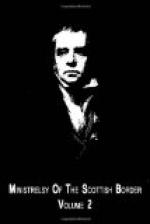was sometimes hinted at, as no unfit model for the
state; at least, the kirkmen laboured to impress, upon
their followers and hearers, the fundamental principle,
that the church should be solely governed by those,
unto whom God had given the spiritual sceptre.
The elder Melvine, in a conference with James VI.,
seized the monarch by the sleeve, and, addressing
him as God’s sillie vassal, told him,
“There are two kings, and two kingdomes.
There is Christ, and his kingdome, the kirke; whose
subject King James the sixth is, and of whose kingdome
he is not a king, nor a head, nor a lord, but a member;
and they, whom Christ hath called and commanded to
watch ower his kirke, and govern his spiritual kingdome,
have sufficient authorise and power from him so to
do; which no christian king, no prince, should controul
or discharge, but fortifie and assist: otherwise
they are not faithful subjects to Christ.”—Calderwood,
p. 329. The delegated theocracy, thus sternly
claimed, was exercised with equal rigour. The
offences in the king’s household fell under
their unceremonious jurisdiction, and he was formally
reminded of his occasional neglect to say grace before
and after meat—his repairing to hear the
word more rarely than was fitting—his profane
banning and swearing, and keeping of evil company—and
finally, of his queen’s carding, dancing, night-walking,
and such like profane pastimes.—Calderwood,
p. 313. A curse, direct or implied, was formally
denounced against every man, horse, and spear, who
should assist the king in his quarrel with the Earl
of Gowrie; and from the pulpit, the favourites of
the listening sovereign were likened to Haman, his
wife to Herodias, and he himself to Ahab, to Herod,
and to Jeroboam. These effusions of zeal could
not be very agreeable to the temper of James:
and accordingly, by a course of slow, and often crooked
and cunning policy, he laboured to arrange the church-government
upon a less turbulent and menacing footing. His
eyes were naturally turned towards the English hierarchy,
which had been modelled, by the despotic Henry VIII.,
into such a form, as to connect indissolubly the interest
of the church with that of the regal power.[A] The
Reformation, in England, had originated in the arbitrary
will of the prince; in Scotland, and in all other
countries of Europe, it had commenced among insurgents
of the lower ranks. Hence, the deep and essential
difference which separated the Huguenots, the Lutherans,
the Scottish presbyterians, and, in fine, all the
other reformed churches, from that of England.
But James, with a timidity which sometimes supplies
the place of prudence, contented himself with gradually
imposing upon the Scottish nation a limited and moderate
system of episcopacy, which, while it gave to a proportion
of the churchmen a seat in the council of the nation,
induced them to look up to the sovereign, as the power
to whose influence they owed their elevation.
But, in other respects, James spared the prejudices




